American actor Conrad Nagel (1897-1970) was a tall, blue-eyed matinee idol of the 1920s. He successfully made the transition to sound film.

German postcard by Ross Verlag Foreign, no. 3785/1, 1928-1929. Photo: Metro-Goldwyn-Mayer. Publicity still for The Mysterious Lady (Fred Niblo, 1928).

German postcard by Ross Verlag, no. 3787/3, 1928-1929. Photo: Metro-Goldwyn-Mayer (MGM). Publicity still for The Mysterious Lady (Fred Niblo, 1928) with Greta Garbo.

German postcard by Ross Verlag, no. 4902/1, 1929-1930. Photo: Metro Goldwyn Mayer. Publicity still for The Hollywood Revue of 1929 (1929) with Anita Page.
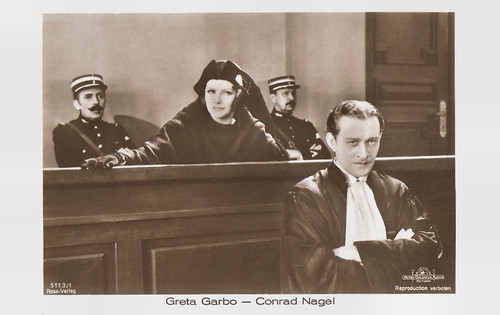
German postcard by Ross Verlag, no. 5113/1, 1930-1931. Photo: Metro-Goldwyn-Mayer (MGM). Publicity still for The Kiss (Jacques Feyder, 1929) with Greta Garbo.

Italian postcard, no. 165. Foto: Ebany.
Conrad Nagel was born in 1897 in Keokuk, Iowa, USA as John Conrad Nagel. Conrad was the son of a musician father, Frank Nagel, and a mother, Frances (née Murphy), who was a locally praised singer. Nagel's mother died early in his life, and he always attributed his artistic inclination to growing up in a family environment that encouraged self-expression. His father became dean of the music conservatory at Highland Park College and when Nagel was three, the family moved to Des Moines, Iowa.
After graduating from Highland Park College in Des Moines, Nagel left for California to pursue a career in the relatively new medium of motion pictures where he garnered instant attention from Hollywood studio executives. He made his film debut in Little Women (Harley Knoles, 1918), the second film adaptation of the Louisa May Alcott story. Nagel got favourable reviews for his role as Laurie. From 1918 to 1962, Nagel was also active on Broadway. His breakout role came in the film The Fighting Chance (Charles Maigne, 1920), opposite Swedish actress Anna Q. Nilsson.
During the 1920s, he became a popular matinee idol thanks to such films as Cecil B. DeMille's Fool's Paradise (1921) and Saturday Night (1922) with Leatrice Joy. He showed an unpretentious all-American charm. Nagel was nicknamed 'the Prince Consort', because of his numerous romantic leads opposite stars like Gloria Swanson, Bebe Daniels and Pola Negri.
In 1927, Nagel starred alongside Lon Chaney Sr., Marceline Day, Henry B. Walthall and Polly Moran in the now-lost Horror film, London After Midnight (Tod Browning, 1927). Among his best-known films are The Mysterious Lady (Fred Niblo, 1928) and The Kiss (Jacques Feyder, 1929), in which he appeared opposite Greta Garbo.
Nagel's career was waning, but he became invaluable to MGM and Warner Bros. by assisting them in passing judgment on their contract players regarding the suitability of their voices for the film microphone. He was an expert thanks to his stage background, and his diction was superb. His salary was raised to $2500 a week and he was loaned out to other studios for a sum of $30,000 for his services in aiding the transition to 'talkies'.
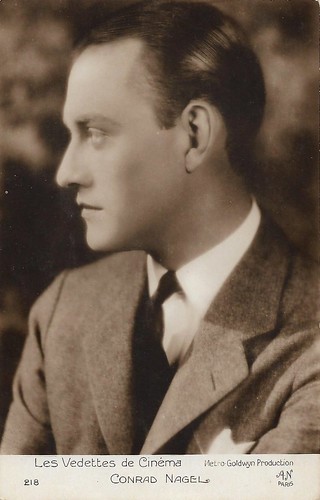
French postcard in the Les Vedettes de Cinéma series by A.N., Paris, no. 218. Photo: Metro-Goldwyn-Mayer.

Austrian postcard by Iris Verlag, no. 728. Photo: Metro-Goldwyn-Mayer Film. Conrad Nagel in The Only Thing (Jack Conway, 1925).

Austrian postcard by Iris-Verlag, no. 885. Photo: Warner Bros. Postcard possibly for the period piece Glorious Betsy (Alan Crossland, 1928), in which Nagel plays Jerome Bonaparte.

French postcard by Europe, no. 705. Photo: Metro-Goldwyn-Mayer.

Dutch postcard, no. 180. Photo: Universal. Genevieve Tobin and Nagel played together in Free Love (Hobart Henley, 1930) and A Lady Surrenders (John M. Stahl, 1930).
Conrad Nagel was one of the 36 founders of the Academy of Motion Picture Arts and Sciences (AMPAS), and from 1932 to 1933, he was the president of the Academy. He was also a founding member of the Screen Actors Guild (SAG).
In his study 'Silent Players', Anthony Slide writes: "He probably deserves more praise for founding the Academy and as a spokesman for Actors' Equity than as an actor, for he was a decidedly bland performer, so innocuous as to almost blend in with the sets of many of his features."
During the 1930s, he appeared in little-known productions such as the action films The Ship from Shanghai (Charles Brabin, 1930), and Kongo (William J. Cowen, 1932) with Walter Huston. He spent the next several decades in high-profile films as a character actor.
Nagel hosted the Academy Awards in 1930, 1932 and again in 1953, this time alongside Bob Hope. He was awarded a Special Oscar in 1947 for his work on the Motion Picture Relief Fund. Towards the end of his film career, Nagel acted as a host for radio and TV shows.
Conrad Nagel died in 1970 in his Manhattan apartment in New York. He was married to Ruth Helms, actress Lynn Merrick and Michael Coulson Smith. All marriages ended in a divorce. He had two children, Ruth Margaret (1920), with his first wife, Ruth, and Michael (late 1950s) with his third wife Michael. The last of his 109 feature films was A Stranger in My Arms (Helmut Käutner, 1959). Anthony Slide: "Curiously, despite the length of his career, the number of features in which he appeared, and the major studios for which he worked, Conrad Nagel did not appear in one film that might be regarded as a classic."
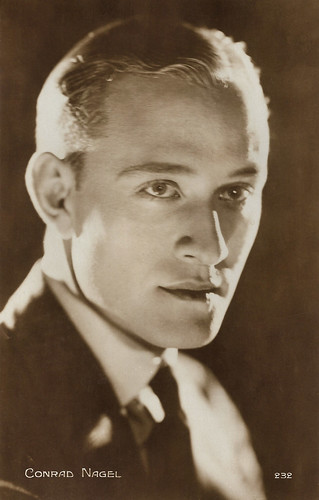
French postcard by Editions Cinémagazine, no. 232.
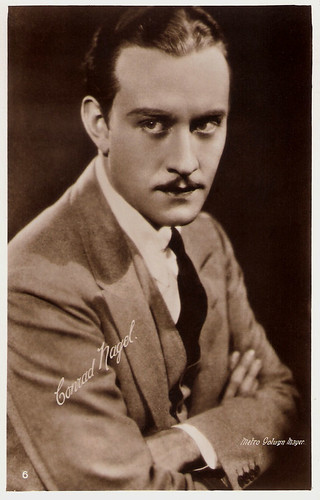
British postcard, no. 6 of a fifth series of 25 cinema stars issued with Sarony Cigarettes. Photo: Ruth Harriet Louise / Metro Goldwyn Mayer.

German postcard by Ross Verlag, no. 3787/4, 1928-1929. Photo: Metro-Goldwyn-Mayer. Publicity still for The Mysterious Lady (Fred Niblo, 1928) with Greta Garbo. Collection: Joanna.

German postcard by Ross Verlag, no. 3924/1, 1928-1929. Photo: Metro-Goldwyn-Mayer. Conrad Nagel and Greta Garbo in the silent spy story The Mysterious Lady (Fred Niblo, 1928), based on the novel 'Der Krieg im Dunkel' by Ludwig Wolff.
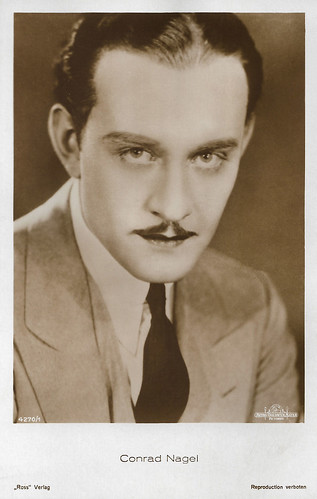
German postcard by Ross Verlag, no. 4270/1, 1929-1930. Photo: Metro Goldwyn Mayer.
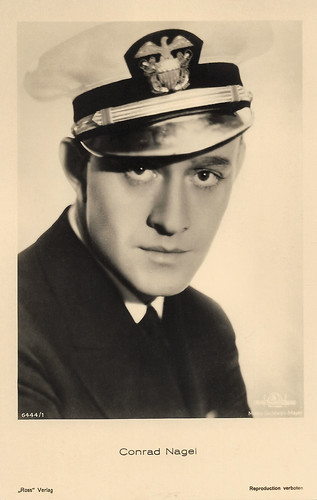
German postcard by Ross Verlag, no. 6444/1, 1931-1932. Photo: Metro-Goldwyn-Mayer. Publicity still for Hell Divers (George W. Hill, 1931).

French postcard by Europe, no. 885. Photo: Metro-Goldwyn-Mayer.
Sources: Anthony Slide (Silent Players), Wikipedia and IMDb.
This post was last updated on 24 February 2024.

German postcard by Ross Verlag Foreign, no. 3785/1, 1928-1929. Photo: Metro-Goldwyn-Mayer. Publicity still for The Mysterious Lady (Fred Niblo, 1928).

German postcard by Ross Verlag, no. 3787/3, 1928-1929. Photo: Metro-Goldwyn-Mayer (MGM). Publicity still for The Mysterious Lady (Fred Niblo, 1928) with Greta Garbo.

German postcard by Ross Verlag, no. 4902/1, 1929-1930. Photo: Metro Goldwyn Mayer. Publicity still for The Hollywood Revue of 1929 (1929) with Anita Page.

German postcard by Ross Verlag, no. 5113/1, 1930-1931. Photo: Metro-Goldwyn-Mayer (MGM). Publicity still for The Kiss (Jacques Feyder, 1929) with Greta Garbo.

Italian postcard, no. 165. Foto: Ebany.
The Prince Consort
Conrad Nagel was born in 1897 in Keokuk, Iowa, USA as John Conrad Nagel. Conrad was the son of a musician father, Frank Nagel, and a mother, Frances (née Murphy), who was a locally praised singer. Nagel's mother died early in his life, and he always attributed his artistic inclination to growing up in a family environment that encouraged self-expression. His father became dean of the music conservatory at Highland Park College and when Nagel was three, the family moved to Des Moines, Iowa.
After graduating from Highland Park College in Des Moines, Nagel left for California to pursue a career in the relatively new medium of motion pictures where he garnered instant attention from Hollywood studio executives. He made his film debut in Little Women (Harley Knoles, 1918), the second film adaptation of the Louisa May Alcott story. Nagel got favourable reviews for his role as Laurie. From 1918 to 1962, Nagel was also active on Broadway. His breakout role came in the film The Fighting Chance (Charles Maigne, 1920), opposite Swedish actress Anna Q. Nilsson.
During the 1920s, he became a popular matinee idol thanks to such films as Cecil B. DeMille's Fool's Paradise (1921) and Saturday Night (1922) with Leatrice Joy. He showed an unpretentious all-American charm. Nagel was nicknamed 'the Prince Consort', because of his numerous romantic leads opposite stars like Gloria Swanson, Bebe Daniels and Pola Negri.
In 1927, Nagel starred alongside Lon Chaney Sr., Marceline Day, Henry B. Walthall and Polly Moran in the now-lost Horror film, London After Midnight (Tod Browning, 1927). Among his best-known films are The Mysterious Lady (Fred Niblo, 1928) and The Kiss (Jacques Feyder, 1929), in which he appeared opposite Greta Garbo.
Nagel's career was waning, but he became invaluable to MGM and Warner Bros. by assisting them in passing judgment on their contract players regarding the suitability of their voices for the film microphone. He was an expert thanks to his stage background, and his diction was superb. His salary was raised to $2500 a week and he was loaned out to other studios for a sum of $30,000 for his services in aiding the transition to 'talkies'.

French postcard in the Les Vedettes de Cinéma series by A.N., Paris, no. 218. Photo: Metro-Goldwyn-Mayer.

Austrian postcard by Iris Verlag, no. 728. Photo: Metro-Goldwyn-Mayer Film. Conrad Nagel in The Only Thing (Jack Conway, 1925).

Austrian postcard by Iris-Verlag, no. 885. Photo: Warner Bros. Postcard possibly for the period piece Glorious Betsy (Alan Crossland, 1928), in which Nagel plays Jerome Bonaparte.

French postcard by Europe, no. 705. Photo: Metro-Goldwyn-Mayer.

Dutch postcard, no. 180. Photo: Universal. Genevieve Tobin and Nagel played together in Free Love (Hobart Henley, 1930) and A Lady Surrenders (John M. Stahl, 1930).
A decidedly bland performer
Conrad Nagel was one of the 36 founders of the Academy of Motion Picture Arts and Sciences (AMPAS), and from 1932 to 1933, he was the president of the Academy. He was also a founding member of the Screen Actors Guild (SAG).
In his study 'Silent Players', Anthony Slide writes: "He probably deserves more praise for founding the Academy and as a spokesman for Actors' Equity than as an actor, for he was a decidedly bland performer, so innocuous as to almost blend in with the sets of many of his features."
During the 1930s, he appeared in little-known productions such as the action films The Ship from Shanghai (Charles Brabin, 1930), and Kongo (William J. Cowen, 1932) with Walter Huston. He spent the next several decades in high-profile films as a character actor.
Nagel hosted the Academy Awards in 1930, 1932 and again in 1953, this time alongside Bob Hope. He was awarded a Special Oscar in 1947 for his work on the Motion Picture Relief Fund. Towards the end of his film career, Nagel acted as a host for radio and TV shows.
Conrad Nagel died in 1970 in his Manhattan apartment in New York. He was married to Ruth Helms, actress Lynn Merrick and Michael Coulson Smith. All marriages ended in a divorce. He had two children, Ruth Margaret (1920), with his first wife, Ruth, and Michael (late 1950s) with his third wife Michael. The last of his 109 feature films was A Stranger in My Arms (Helmut Käutner, 1959). Anthony Slide: "Curiously, despite the length of his career, the number of features in which he appeared, and the major studios for which he worked, Conrad Nagel did not appear in one film that might be regarded as a classic."

French postcard by Editions Cinémagazine, no. 232.

British postcard, no. 6 of a fifth series of 25 cinema stars issued with Sarony Cigarettes. Photo: Ruth Harriet Louise / Metro Goldwyn Mayer.

German postcard by Ross Verlag, no. 3787/4, 1928-1929. Photo: Metro-Goldwyn-Mayer. Publicity still for The Mysterious Lady (Fred Niblo, 1928) with Greta Garbo. Collection: Joanna.

German postcard by Ross Verlag, no. 3924/1, 1928-1929. Photo: Metro-Goldwyn-Mayer. Conrad Nagel and Greta Garbo in the silent spy story The Mysterious Lady (Fred Niblo, 1928), based on the novel 'Der Krieg im Dunkel' by Ludwig Wolff.

German postcard by Ross Verlag, no. 4270/1, 1929-1930. Photo: Metro Goldwyn Mayer.

German postcard by Ross Verlag, no. 6444/1, 1931-1932. Photo: Metro-Goldwyn-Mayer. Publicity still for Hell Divers (George W. Hill, 1931).

French postcard by Europe, no. 885. Photo: Metro-Goldwyn-Mayer.
Sources: Anthony Slide (Silent Players), Wikipedia and IMDb.
This post was last updated on 24 February 2024.
No comments:
Post a Comment